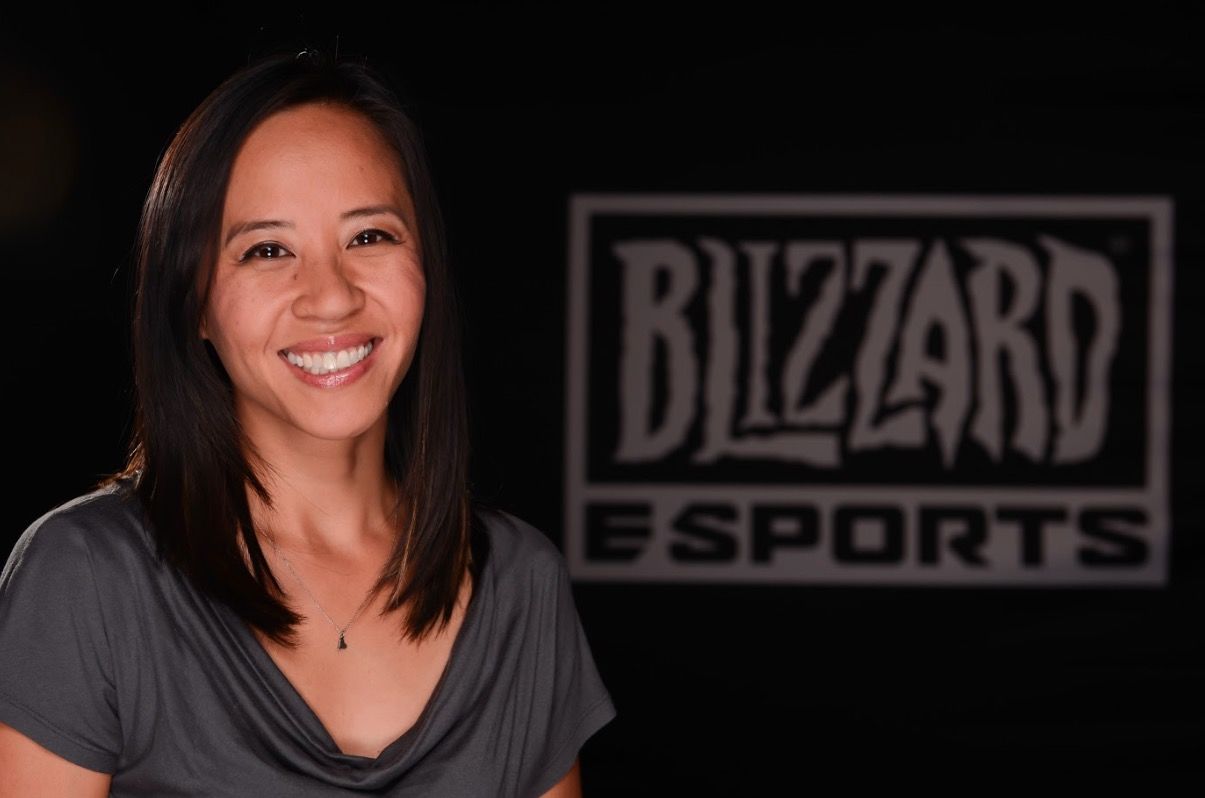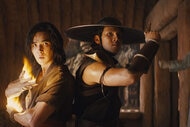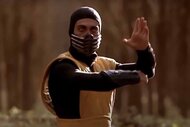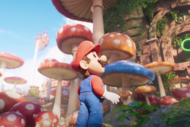Create a free profile to get unlimited access to exclusive videos, sweepstakes, and more!
Women of esports: Kim Phan, Director, Esports Operations at Blizzard

In our continuing series on the women of esports, we're chatting with Kim Phan, Director, Global Esports at Blizzard. Kim’s been with Blizzard for over 12 years and has worn multiple hats: She’s been in software engineering, business intelligence, and is now overseeing all Blizzard esports programs. Kim got her foot in the door for her love of WarCraft III and esports. She ran a community website for WarCraft III and casted a few WarCraft III tournaments. She told SYFY FANGRRLS all about what her job entails and what she's seen in the years she's been involved in esports. (She also tells us if she's Horde or Alliance!)
Can you tell us about your job and what it's like?
I'm the director of global esports. So I oversee the global programs across a majority of our franchises with World of Warcraft, StarCraft, our classic games. Another area that I oversee is our shared services, which is all of the functions that are supporting all of our programs. So you have teams such as our project management team, our travel and hospitality team, our vendor management team, and our payments team. And so those folks are supporting across multiple games and multiple franchises. So I've been on the esports team now for about six years. I helped build the team and I love it, it's a great team.
What is your day-to-day like?
Typical in the sense where I am in meetings quite a bit, but every day is unique. But if I could summarize like a schedule to it, I spend a good amount of time with the teams that I oversee. I am just keeping up to date with directions that they're taking. I provide guidance as needed. I'm doing a lot of approvals when I'm reviewing their final outcome or decisions that are being made. I am very passionate about esports in general and the community in general.
When I can, usually before work or at night, I like to read over social media, see how the community is responding to our broadcast, if there's one going live. I read everything from Reddit.
I do keep up with how the community is responding in general. I think it's important just for anyone really who is passionate about a community to know what is going on in the community. But if I'm not spending time working directly with the teams within esports, I am spending a lot of time working with teams outside of esports and the leaders of the other organizations, other departments in our organization. And that's just whether I'm trying to gain alignment or I'm trying to provide more visibility into the amazing work that my team is doing. I'm also sharing our vision, our strategy, I'm providing requirements. There are a lot of teams within Blizzard working together, and that's where I spend a good chunk of my time to make sure we're all on the same page, especially having been at Blizzard now, I'm about to reach 13 years next month. I know all of the teams pretty well.
You ran a community for Warcraft, and I'm just curious about the differences in what the community is like.
The game that I probably spent the most of my time in my whole life is Warcraft III, and that is the real-time strategy game. It was made before World of Warcraft, and that was the game that I built the community site around. It tells the story I think of what actually happened before World of Warcraft started, regarding the lore. But that's where I spent most of my time. How is it different? It's actually not too different in the sense that, running a community site, you're surrounded by people who are extremely passionate about the same thing that you are. And in this case, it was Warcraft III. Everybody loved to play it, they loved to talk about it, they loved to write about it. And we just really appreciated the level of play that the professional players were competing at. And that was amazing to see, so much that we wrote coverage about it and had an entire fansite about it.
And I would say very similar to what I do at Blizzard today is different games, more games. But the people that I work with at Blizzard are just as passionate about our products. They love watching esports just as much. And I consider us a part of the community as well. The only difference is that we have the ability to impact change within Blizzard as opposed to outside. But I really do believe that the community outside of Blizzard is just as strong as the community within Blizzard.
So how did you get into gaming?
I started playing video games really young. I think 5 years old. My mom picked up an Atari from a garage sale and it just had a bunch of video games that came with it, and she just wanted to keep my brother and I busy. And so we were super excited. We loved it. We were glued to the ... no, it wasn't a computer, we were glued to the TV, and we played through all of the games all of the time. And so she just kind of figured out that if she went to different garage sales like when a new gaming console came out, she could always find the old one, because people were always getting rid of the old one.
So we were always a few generations behind on the console, but she would find an old gaming console with all the games and she'd bring it home and then we would get to play. And that's really where it all started for me. But I probably would say that it wasn't until college that I really got into gaming in the sense of knowing that there was a community outside of your friends on the street, on the block that you play with. And that's where I was introduced to ... I mean, I guess it makes sense, that's when the internet came out, and people started writing on forums and you're able to connect with others that live further away from you. And it just continued to grow from there.
So, we'd love to know how you got into esports, because everyone seems to have a really interesting way in.
Yeah. It definitely started with the fan site that I created. That was esports back then, even though we didn't call it esports. I don't think they used the term esports was known. We just called it tournaments back then, or live tournaments, or LANs. And for me, it was the first time that I loved a game more than just playing. I think all of the games in the past I just loved playing. And I think the thing with esports, it's not just playing. It's spectating. It's the community behind it. It's coming together, and we were able to do that with the fan site, even though we weren't physically there together. There was a plugin on Winapp that was called Shout Cast. That is what allowed you to commentate a match.
So imagine like radio casting, because Twitch wasn't out yet, YouTube wasn't out yet. So you weren't able to watch other people play games, but you could listen to someone commentate. And that's what I did for fun. I used to create audio commentaries where ... at the fan site, it's all about teaching others, right? You go to the fan site, you look up resources, you learn different strategies. And I wanted to be different, I wanted to innovate, and instead of a written strategy guide, I wanted to do an audio strategy guide. And so you would load up a replay, and you would commentate and teach people the different strategies.
And so that's what I did at first. And so it was recorded audio, someone could then download the replay and download the audio and hit play, and listen to my commentary while watching the replay. And that's how you learned. And so, from there, shoutcasting became a thing, which then became live commentary. And so I got into that, where the best of the best players would be competing and everyone would want to know how they are performing but you can't watch because there's only eight observer spots, and so everyone else can't see the best players play, so they would have someone commentate.
I would log in, I would commentate it live, as you would imagine radio cast you have to paint a picture for people to see in their minds, because they couldn't see the game. And I did that for fun. So I would probably say that was the start of esports for me. And then from there I was a part of a clan, which is I guess a pro team. I end up managing a professional team in North America, which then competed in the online league, and I was the manager of that league, and then I also competed in it and won a couple of matches. So I did it all in esports way back then.
Since you've been in it so long, what are your thoughts on how esports has changed and where you see it going?
It has changed a lot, and definitely for the better. I think it changes along with technology, so the biggest change is with video streaming and live streaming. That's kind of the huge innovation where now people are able to watch their favorite players play and it be broadcast. And you see that evolve and become more professional, with higher quality.
And I think then the next evolution is then professional play on-site. That has been happening for years, people getting together and competing at LANs, but never at the level that it is now. And so you know where you have tournaments being played on a big stage with high production, selling out an arena. So that's all crazy. I never imagined esports would reach this point, so that's pretty cool. And then when you talk about where does it go from here? There is a lot of possibilities, but you're already seeing media getting involved and sponsors getting involved, so in terms of distribution, rights, broadcasting the matches, not only on linear television but globally online, esports is very unique from physical sports because it is a global sport. You are able to play from across the globe and compete across the globe, and you have an audience all over the world that is very engaged and excited about it. So the possibilities are really endless.
What do you see as far as how the players have been changing?
The players change, you do see a younger demographic, but I think it depends on the game. So some games attract a younger demographic, and then some games have a more mature demographic. So you take a look at World of Warcraft, which has been around for a very long time, the players who compete in World of Warcraft are on the older side compared to like the players who compete in Overwatch. So I think it depends on the game. But there is more professionalism in the sport itself, so that's something that I see that's different, and especially with leagues, players are ... it's becoming a job for people, where before it was not, it was more of a hobby. And that isn't applied across all games, right, but I think that's where you're seeing it evolve to. So the players are changing in terms of taking it seriously as a career, and those who have been competing for a while who have retired are becoming coaches or managers. And so you're seeing players have evolved their role, I guess, within the industry.
What advice would you have for people who'd like to do the sort of thing that you're doing right now?
I would probably say the advice I would give is to try ... esports is a big industry, and there's a lot of areas where you can get involved. So it can be very overwhelming. My advice would be for someone to narrow it down to maybe two or three areas that excite them the most about esports, and to learn more about that area. So an example could be broadcasting. Maybe someone wants to learn how to broadcast and geek out on the tech side. Or maybe it's actual competition itself. Competing. Or maybe another area could be as a talent, as a commentator, an analyst, or a host. Or just creating and organizing the tournament itself. Event management or tournament administration. So there's just so much to do with esports, and oftentimes people who want to get involved are fans watching. So they just watch and they think it's really cool. But you have to really narrow it down, and I think if you don't narrow it down, you're gonna get really overwhelmed and you don't know where to go or where to start. And so I would start there.
My job specifically, I would probably say to take a look at esports and try to see what problems there are to solve. We are growing, we're a young, growing industry, and there are many different problems we as a community can solve. And so, how can we improve in areas, and what areas, and what is it that you believe you can contribute in that way, whether it's like a product or a program or something. And that's where I'm spending a lot of my time at my level, on how to build upon this awesome community that we have.
And then from there, it's mostly about what games are you excited about? Get involved in that community. If you love Hearthstone, and you play Hearthstone, get involved in that community. Be a part of it. Communicate to others, try to understand pain points or what people like or don't like. And then help improve it.
And before we wrap I have to ask you, Horde or Alliance?
Oh, you know, it's so funny. I guess I could answer it ... no, it's hard, because I flip-flop back and forth. I feel like a lot of people at Blizzard are always like, "For the Horde!" I mean, that's what you always hear. Like at BlizzCon, that always just sounds louder than the Alliance. But I've played both. So I don't know that I am like, I pledge my allegiance for one or the other. I love the Horde logo, but I like all of the Alliance characters. So I am seriously split in the middle. I'm not saying that because I have to, I just really am.
You can follow Kim Phan on Twitter @kimaphan.


























